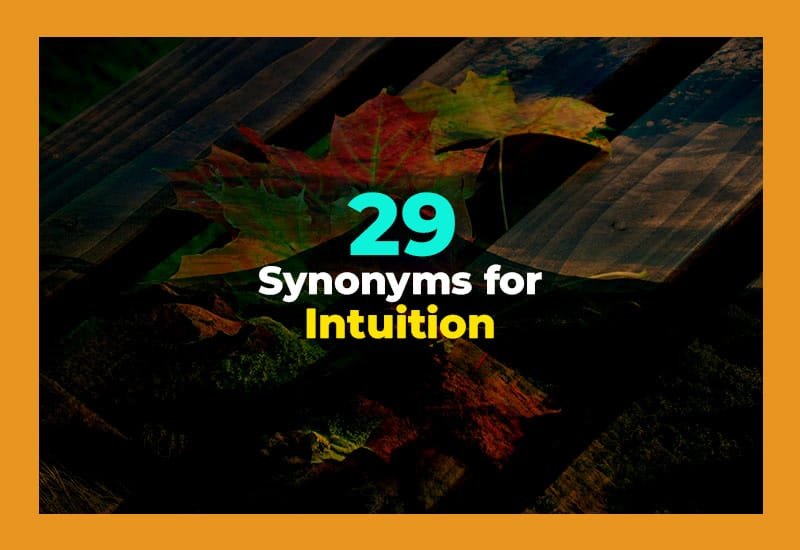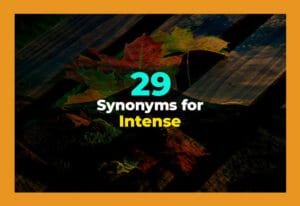Intuition is that quiet inner voice guiding us when logic takes a backseat. It's that gut feeling, hunch, or sixth sense that seems to know things before you do. Everyone has felt it—whether making a decision or sensing something's off. In this article, we'll explore 29 other ways to say intuition with meanings and examples.
29 Different Ways to Say INTUITION: Another Word for INTUITION
1. Instinct
Instinct is the natural reaction or inner drive that tells you what to do without much thinking. It's what kicks in when you just know something feels right or wrong. People use instinct when making choices in the moment or dealing with emotional decisions. It's powerful because it comes from deep within. Trusting your instinct often helps in uncertain times, especially when there's no time to analyze every detail. It connects the mind and body in a fast and direct way.
- I followed my instinct and turned down the offer.
- His instinct told him she was hiding something.
- Always trust your instinct when meeting new people.
2. Insight
Insight is that sudden understanding that lights up your mind like a bulb. It's more about seeing things deeply and clearly rather than guessing. When you have insight, you don't just see the surface—you notice the meaning behind it. This word works well when describing wisdom that comes from experience. Insight is used a lot in problem-solving and emotional understanding. It makes you look beyond what's obvious and notice the real cause.
- She shared an interesting insight about human behavior.
- His insight into the situation helped the team move forward.
- With a bit of insight, she solved the problem easily.
3. Perception
Perception is how you see or interpret the world around you. It's not always about facts but how your mind understands what's happening. When someone has good perception, they pick up small details others might miss. It's useful in communication, decision-making, and relationships. Perception gives depth to your understanding and helps you respond wisely. It's a close cousin to intuition but often more observant.
- His perception of people is very sharp.
- She has a strong perception of moods in the room.
- Perception plays a big role in how we handle conflict.
4. Hunch
A hunch is that sudden feeling that something might happen or is true. It doesn't come from facts but from a kind of inner knowing. People often say "I have a hunch" when they sense what's right without proof. A hunch is perfect when you want to express an idea that feels right even before confirming it. It's often used in daily talk, especially for gut-based decisions.
- I have a hunch he'll show up late.
- She acted on a hunch and bought that stock.
- My hunch turned out to be completely right.
5. Gut Feeling
A gut feeling is that deep sense in your stomach that tells you what's true. It's physical and emotional at the same time. You feel it more than you think it. This phrase fits perfectly when talking about quick decisions or emotional awareness. It's often used when logic can't explain your choice. Trusting your gut feeling can save time and protect you from wrong moves.
- My gut feeling told me not to trust him.
- She followed her gut feeling and found success.
- Go with your gut feeling—it's usually right.
6. Sixth Sense
The sixth sense is often used when someone seems to know things without explanation. It's that extra sense beyond the usual five that helps people feel energy, emotion, or danger. It sounds mystical, but it describes powerful awareness. Many use it when talking about empathy or intuition in relationships. It's like having an invisible radar guiding your choices.
- She seems to have a sixth sense about people's moods.
- His sixth sense warned him something was wrong.
- The sixth sense can help you avoid risky situations.
7. Inner Knowing
Inner knowing is when you feel certain about something deep inside without needing proof. It's calm, quiet, and confident. You just know, even if you can't explain why. People often connect this with mindfulness or personal growth. It's helpful when making life decisions because it comes from a peaceful, grounded place. Inner knowing feels natural and trustworthy.
- Her inner knowing guided her to move abroad.
- He trusted his inner knowing instead of asking for advice.
- Inner knowing helps you make decisions from the heart.
8. Presentiment
Presentiment is the feeling that something is about to happen, often before it does. It's more emotional than logical. Many describe it as a soft warning or gentle signal from within. This word fits perfectly in situations when you sense an event before it unfolds. It often appears in storytelling or personal reflection. Trusting presentiment helps you prepare for what's coming.
- She had a presentiment of trouble before the storm.
- His presentiment proved right when the news arrived.
- I couldn't shake the presentiment that something big was coming.
9. Premonition
Premonition is similar to presentiment but stronger—it's a clear feeling that something specific will happen. It's almost like a mental image of the future. People often use it when describing a sudden awareness of upcoming events. It's mysterious but very relatable. Premonition adds a sense of depth to your intuition. It's that moment when you feel you've seen it before.
- I had a premonition that the trip would change my life.
- Her premonition came true when the storm hit early.
- He couldn't ignore the premonition that something was off.
10. Clairvoyance
Clairvoyance refers to the ability to perceive things beyond normal senses. It's often seen as a heightened form of intuition. This word is used in both spiritual and psychological contexts. Clairvoyance captures the idea of inner sight—seeing truth clearly even without facts. It shows awareness that feels almost magical. Some describe it as a talent for reading energy or future events.
- She showed clairvoyance in predicting the company's success.
- His clairvoyance about people amazed everyone.
- Clairvoyance helps in understanding what's unseen.
11. Awareness
Awareness is simply being conscious of what's happening around or within you. It's that mental presence that allows you to notice details, feelings, or patterns. Awareness works as the foundation of intuition because it helps you sense things early. It's used in personal growth, mindfulness, and leadership. Being aware makes your reactions more accurate and confident.
- Awareness helps you catch small changes in behavior.
- Her awareness of others made her a great manager.
- Awareness opens the door to better decision-making.
12. Discernment
Discernment is the skill of telling right from wrong or true from false. It's intuitive judgment mixed with wisdom. When you use discernment, you combine logic with feeling. This word works well in both spiritual and professional settings. It's valuable because it helps you filter out noise and stay true to your values. Discernment comes with maturity and observation.
- He used discernment to choose the right business partner.
- Discernment kept her away from risky decisions.
- True discernment grows through experience.
13. Penetration
Penetration describes deep mental sharpness or the ability to see beneath the surface. It's often used for people who notice what others miss. This word highlights mental power and intuition combined. It's about getting to the core of things quickly. Penetration works well in analytical or creative discussions. It's another way of saying someone has deep understanding.
- Her mental penetration made her a strong strategist.
- He admired her penetration into human motives.
- Penetration helps uncover hidden truths.
14. Acumen
Acumen refers to quick and accurate decision-making, often based on intuitive understanding. It's usually linked to business, leadership, or analysis. Someone with acumen doesn't just know facts—they sense what will work. This word suggests intelligence with an intuitive edge. It's practical intuition in action. Acumen combines insight, instinct, and experience in perfect balance.
- Her business acumen led to major success.
- He showed great acumen during the negotiation.
- Acumen helps turn ideas into smart actions.
15. Sagacity
Sagacity means wise understanding that comes from both experience and intuition. It's not just about being smart—it's about being perceptive and thoughtful. People with sagacity notice connections others overlook. It's useful when giving advice or handling complex situations. Sagacity combines heart and mind in perfect harmony. It's intuition made mature through reflection.
- His sagacity guided the team through challenges.
- She's admired for her sagacity in difficult decisions.
- Sagacity helps leaders see beyond the surface.
16. Understanding
Understanding goes beyond facts—it's about truly grasping what something means. It's emotional and intellectual at once. People with strong understanding sense the reason behind actions. This word fits well in both personal and professional conversations. It's a kind of intuition that builds connection. Understanding helps avoid confusion and deepen empathy.
- His understanding of people made him a trusted friend.
- She showed deep understanding in her response.
- Understanding helps resolve conflicts smoothly.
17. Apprehension
Apprehension here means the ability to grasp an idea quickly, not fear. It's like quick intuition that helps you catch on fast. When someone has good apprehension, they sense meaning before full explanation. It's useful in learning, reading situations, or noticing danger. This word connects with sharp awareness and instinctive recognition.
- Her quick apprehension impressed the teacher.
- He had a natural apprehension of tone and emotion.
- Apprehension helps in fast decision-making.
18. Sense
Sense is the broadest and simplest word related to intuition. It covers awareness, instinct, and judgment all at once. People say "I get a sense that…" when they notice something unspoken. It's a comfortable, flexible word you can use anytime. Sense connects both the emotional and rational sides. It's the everyday version of intuition that everyone understands.
- I have a sense something's wrong.
- She got a sense that he wasn't being honest.
- His sense of timing is always perfect.
19. Sensitivity
Sensitivity means tuning into emotions, energy, or situations deeply. It's not weakness—it's awareness that feels with clarity. Sensitive people often notice small changes and react thoughtfully. Sensitivity and intuition go hand in hand because both rely on emotional awareness. It helps in relationships, creativity, and self-understanding.
- Her sensitivity made her a kind listener.
- He felt the room's tension through his sensitivity.
- Sensitivity can guide you in helping others.
20. Spontaneous Understanding
Spontaneous understanding is when you grasp something instantly, without needing a reason. It feels effortless, like your mind jumps straight to the answer. This word is useful when describing quick decisions that turn out right. It's great for creative or intuitive processes. Spontaneous understanding often appears during brainstorming or emotional insight.
- She had a spontaneous understanding of what he meant.
- His spontaneous understanding surprised everyone.
- Trust your spontaneous understanding during tough calls.
21. Inference
Inference is drawing a conclusion from small signs without full information. It's more logical than emotional but still connected to intuition. It happens when your brain fills in gaps naturally. Inference fits well in both reasoning and intuition because it blends facts and feeling. It's the thinking side of gut reactions.
- I made an inference based on her tone.
- His inference turned out right about the project.
- Inference helps connect clues in daily life.
22. Feeling
Feeling refers to emotional awareness that guides choices. It's that inner pull that tells you what's right or wrong. When used like intuition, it means trusting emotions instead of logic. Feeling often leads to empathy and understanding others better. It's especially powerful in relationships and creative work.
- I had a feeling we'd meet again.
- She followed her feeling and avoided trouble.
- My feeling tells me this is the right move.
23. Impression
Impression is the first thought or reaction you get when meeting someone or seeing something new. It's often instant and based on intuition. People rely on first impressions all the time. This word works when describing emotional or instinctive judgment. It's quick, automatic, and often accurate.
- My first impression of her was very positive.
- He gave the impression of being confident.
- Impressions often shape relationships early on.
24. Perceptiveness
Perceptiveness means being quick to notice what others don't. It's the skill of seeing deeper meaning in words, behavior, or events. Perceptive people trust their inner signals. It's closely related to intuition but adds sharpness and accuracy. This trait helps in emotional intelligence, leadership, and creativity.
- Her perceptiveness helped the team avoid mistakes.
- He's admired for his perceptiveness in conversations.
- Perceptiveness helps in reading situations quickly.
25. Quickness of Perception
Quickness of perception means noticing and understanding things fast. It's like your brain connecting the dots before others do. This phrase shows both alertness and intuition. It's great for describing people who react wisely under pressure. Quick perception often leads to better decisions and insights.
- Her quickness of perception saved the project.
- His quickness of perception made him a great manager.
- Quickness of perception helps catch hidden issues early.
26. Subconscious Knowledge
Subconscious knowledge comes from the part of the mind that works quietly in the background. It's what you know without realizing how. This kind of knowing often appears in dreams, gut reactions, or flashes of clarity. It's deeply intuitive because it bypasses conscious thought. It's like wisdom that lives below the surface.
- She relied on subconscious knowledge during meditation.
- His subconscious knowledge guided his choices.
- Subconscious knowledge often appears when you relax your mind.
27. Inner Voice
Inner voice is that whisper inside you giving guidance or warning. It's the sound of your intuition speaking through thoughts and feelings. Many people use it to describe self-trust or moral direction. Listening to your inner voice helps make choices that feel authentic. It's gentle but persistent.
- My inner voice told me to slow down.
- Her inner voice encouraged her to take the leap.
- Trust your inner voice during confusion.
28. Gut Instinct
Gut instinct is pure, direct intuition that feels physical. It's the instant reaction you get before thinking too much. It's often used in business, relationships, or safety decisions. People rely on gut instinct when logic can't keep up. It's your inner radar reacting fast to energy around you.
- I made the call based on gut instinct.
- Her gut instinct about the deal was spot-on.
- Always listen to your gut instinct in tough choices.
29. Intuitive Sense
Intuitive sense means a natural ability to understand or feel what's right. It's like being tuned into hidden information. This phrase shows harmony between feeling and awareness. It's perfect when describing balanced, thoughtful intuition. Intuitive sense helps in creativity, empathy, and emotional clarity.
- She has an intuitive sense for good timing.
- His intuitive sense always leads him to success.
- Trust your intuitive sense when logic fails.
| Synonym | Example |
|---|---|
| Instinct | Trust your instinct when making a big decision. |
| Insight | Her insight helped solve the mystery. |
| Perception | His perception of the situation was accurate. |
| Hunch | I had a hunch it would rain today. |
| Gut Feeling | My gut feeling says this is the right choice. |
| Sixth Sense | She has a sixth sense about people. |
| Inner Knowing | Her inner knowing guided her perfectly. |
| Presentiment | He felt a presentiment before the call came. |
| Premonition | I had a premonition of the event. |
| Clairvoyance | His clairvoyance surprised everyone. |
| Awareness | Awareness helps you avoid repeated mistakes. |
| Discernment | Her discernment makes her an excellent judge. |
| Penetration | His mental penetration impressed his peers. |
| Acumen | She showed great acumen in business. |
| Sagacity | Sagacity comes with patience and observation. |
| Understanding | Understanding builds strong relationships. |
| Apprehension | His apprehension helped him catch the idea quickly. |
| Sense | I have a sense something's off. |
| Sensitivity | Her sensitivity made her compassionate. |
| Spontaneous Understanding | His spontaneous understanding surprised everyone. |
| Inference | I made an inference from her reaction. |
| Feeling | My feeling tells me to wait. |
| Impression | My first impression of her was great. |
| Perceptiveness | His perceptiveness helped spot the mistake. |
| Quickness of Perception | Her quickness of perception saved time. |
| Subconscious Knowledge | His subconscious knowledge guided his steps. |
| Inner Voice | My inner voice told me to stay calm. |
| Gut Instinct | Her gut instinct was right again. |
| Intuitive Sense | His intuitive sense led to the best result. |

Final Thoughts
Intuition takes many forms, from a gut feeling to a quiet inner voice. Each synonym adds its own shade of meaning and depth. Use them to express that deeper awareness in daily life or writing—they bring your thoughts closer to how intuition truly feels.









